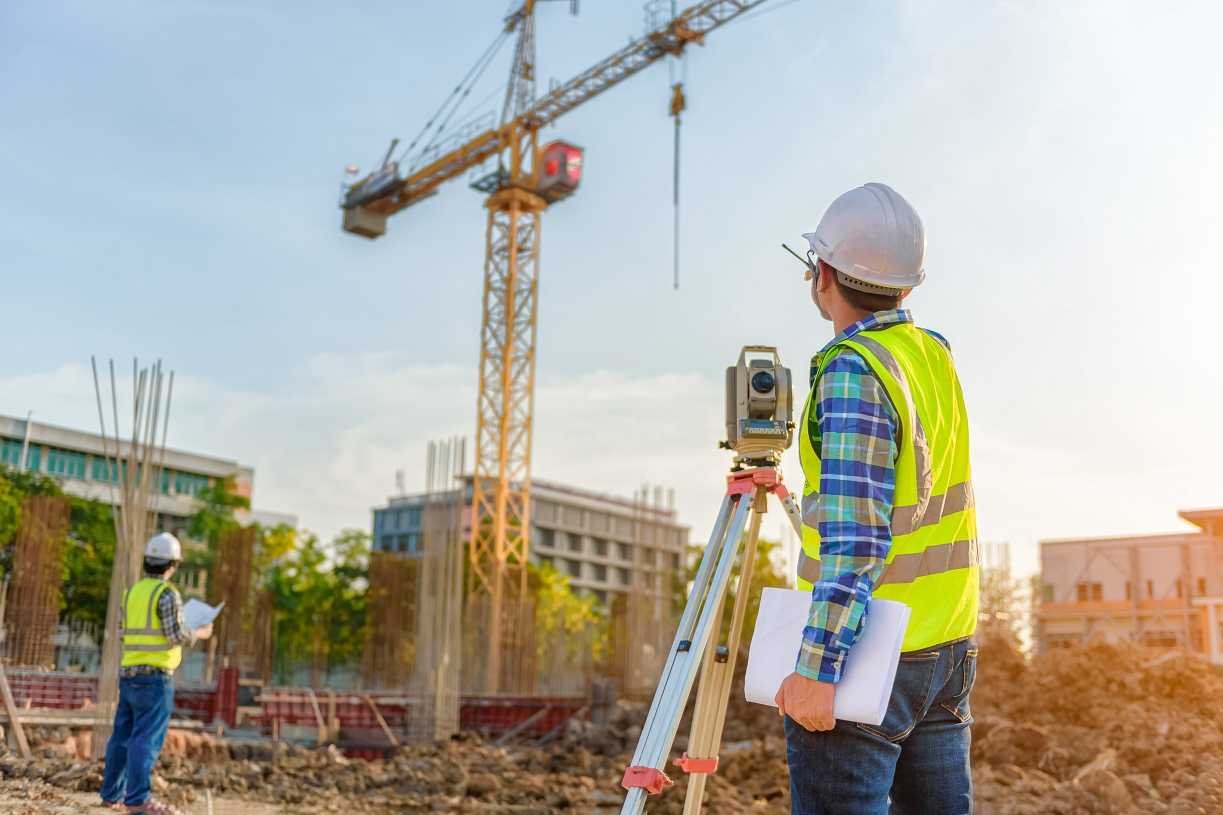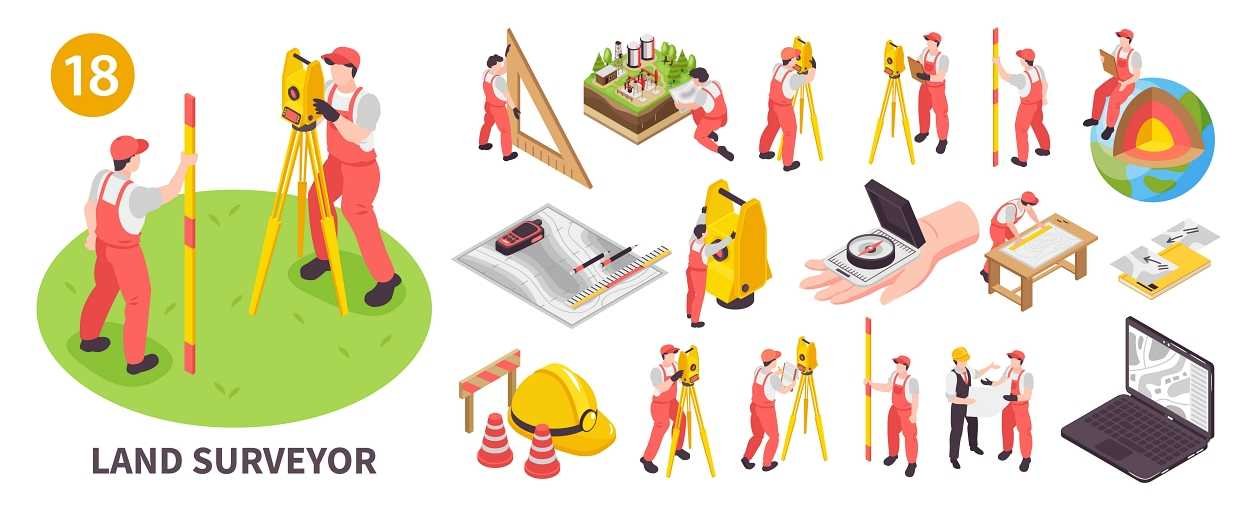In construction and engineering, professionals must prioritize precision and must recognize it. Laying foundations, planning massive infrastructure projects, and residential structures – accurate spatial data is the platform necessary for every successful venture in these fields.
What professionals are responsible for supplying this essential information? Land surveyors.
Often working behind the scenes, the expertise of land surveyors drives the construction business in the right direction. Their work also nurtures technical innovation, which helps the industry adapt to modern challenges and opportunities. To put their contributions into perspective, this guide highlights the land surveying profession.
This text covers the role of a land surveyor and examines the new skills needed in the digital age. If you are a civil engineer, urban planner, or developer, you must understand land surveyors. I think this knowledge is essential for your work.
Understanding land surveyors is also essential for becoming one of these professionals. They play a key role in shaping our changing environment.
The Land Surveying Profession: A Brief Overview
In summary, land surveying involves measuring and mapping the environment using specialized equipment and techniques.
Land surveyors play an important role in construction projects. They find property boundaries, map land features, and decide where to place buildings.
Professionals in this field achieve this by creating detailed maps and blueprints. These documents – which cover precise distances, angles, and elevations – are necessary for guiding the construction progress. That includes legal compliance and supporting land management.
Surveyors cover various sectors. These sectors include commercial construction, infrastructure projects, and environmental conservation. What makes a successful land surveyor? Those with the right expertise support the safe development of properties, minimize disputes over boundaries, and efficiently manage resources.
Importance of Land Surveyors in Construction and Technological Advancements
It may sound dramatic, but in today’s fast-growing cities and technology, land surveying is more important than ever.
Land surveyors are indispensable to modern construction. No question.
They supply the foundational data that drives every stage of a project. From planning to execution, their precise measurements ensure that builders correctly place structures. This helps meet design specifications and follow legal boundaries.
However, don’t misconstrue the job as simply measuring land. They facilitate the transformation of visions into reality. They minimize risks and avoid costly errors. They set the foundation for construction success.
In the rapidly progressing construction landscape, the integration of advanced technologies has revolutionized the surveying profession. Geographic Information Systems (GIS), Building Information Modeling (BIM), and 3D scanning are useful tools for surveyors.
They help surveyors make detailed and accurate maps. The result is that architects, engineers, and contractors can see projects clearly. This clarity helps improve decision-making and teamwork.
Moreover, modern innovation in the land surveying profession has introduced autonomous drones and real-time data processing. As a result, we have further streamlined data collection and analyzing. These innovations also save time, reduce costs, and enhance safety – particularly on large or hazardous sites.
That’s not all. Using the latest AI and machine learning, surveyors can now predict site issues and improve sustainability in construction.
So, why is land surveying important for urban planning? As construction projects grow in complexity, so does the importance of land surveyors.
Forget about them being simply data providers. These professionals are integral to project planning, risk assessment, and technological integration. They bridge the gap between conceptual designs and physical realities, ultimately shaping the built world of tomorrow.

What Is Land Surveying, and Why Is It Important?
Land surveying is a process that measures and maps land. It helps determine boundaries, sizes, and physical features of a site.
Using special land surveying tools and methods, these professionals gather and study data. This data is essential for designing and carrying out construction projects. The role includes science, technology, and engineering. It ensures that buildings are in the right place and follow strict rules.
At its core, precision builds land surveying. It establishes critical spatial data, the type that informs decision-making across various industries. If land surveys are not accurate, projects can face many problems. These issues can include misalignment, legal disputes, and even structural failures.
Why is land surveying important?
Several reasons underline the vital nature of land surveying. Here are some important reasons why this profession is essential. It directly affects the safety and success of construction projects.
- Establish legal boundaries: Surveyors define property lines to prevent disputes between landowners. This guarantees legal compliance during the development and construction phase.
- Support accurate construction planning: Survey data ensures that foundations, roads, and utilities are placed correctly. The team avoids costly errors and project delays.
- Enhance safety: It’s imperative that construction projects avoid risks like structural failures and landslides. Land surveyors assess terrain stability and other environmental factors in construction to boost safety.
- Facilitate environmental management: Surveying supplies data for sustainable land use, which helps balance development with environmental preservation.
- Enable advanced technologies: Modern tools like GIS and BIM rely on survey data for accurate modeling. Land surveying technology like this is driving innovation in construction and urban development.
In summary, land surveying is the framework of any well-planned construction project. By delivering precise, actionable data, surveyors ensure development is both efficient and sustainable. This essential profession is the foundation of modern engineering and infrastructure.

What Skills Do Land Surveyors Need?
To become a land surveyor, it’s important to know this is a specialized job. It requires a range of skills to do well in this field. After all, the role is a unique blend of technical expertise, analytical thinking, and interpersonal abilities.
Technology helps the surveying profession in many ways. However, it still needs the right mix of skills to succeed.
To better understand this, here are the key skills every land surveyor needs to succeed in their job.
1. Technical proficiency
When thinking about the skills needed for land surveying, there’s only one place to start. Technical expertise is the foundation of a land surveyor’s skill set. These professionals use advanced tools and software to collect, process, and analyze data.
Here’s an example of the devices used:
- Surveying equipment: Total stations, theodolites, GPS systems – mastery of tools like these is essential for accurate measurements.
- Geospatial technology: Familiarity with GIS and BIM technology is necessary for creating detailed maps and 3D models.
- Data analyzing software: Competence in specialized programs like AutoCAD, Civil 3D, and surveying-specific applications allows surveyors to effectively process and interpret spatial data.
2. Analytical and problem-solving skills
To start a career in land surveying, remember that one of your main jobs is to solve spatial problems. Whether it’s determining property boundaries or assessing land for construction, analytical thinking is critical.
For instance, surveyors must interpret data accurately to offer actionable insights. They need to identify potential site issues, such as unstable terrain or environmental risks that could pose construction challenges. Also, it’s not only about spotting these problems. Surveyors need to develop creative solutions to overcome challenges during planning and execution.
3. Legal knowledge
Many people outside the profession may overlook it, but knowing property law and regulations is key for land surveying. Surveyors ensure all projects comply with legal standards. Doing so protects clients from disputes or violations, which could be both costly and time-consuming.
As for what legal knowledge is necessary, surveyors interpret land deeds and legal descriptions. They guarantee compliance with zoning laws, building codes, and environmental regulations. Additionally, if it comes to it, surveyors provide expert testimony in court cases involving land boundaries.
4. Communication skills
Every job requires a certain level of communication skills. However, this is especially the case for land surveyors. This is because they must communicate effectively with a variety of stakeholders, including clients, engineers, architects, and government officials.
How is this done ‘effectively’? Here are the key aspects that need to be covered:
- Clarity: Explain technical data and maps in a way non-specialists can understand.
- Collaboration: Work as a part of a team to align survey data with project goals.
- Documentation: Prepare accurate reports, charts, and legal documents.
5. Adaptability to emerging technologies
One of the benefits of a land surveying profession is the ability to work with emerging technologies. This profession is rapidly evolving with advancements in tools and software solutions. These solutions open the door to completing projects more effectively and efficiently.
Surveyors with experience in this field should be open to learning. They need to integrate these technologies into their work. As for current solutions, here are some of the best tools for land surveying in 2024:
- Drones: Leverage drones equipped with LiDAR or high-resolution cameras for efficient data collection.
- AI and machine learning: Use predictive algorithms for site evaluation and risk assessment.
- Real-time data processing: Adopt tools that enable on-site analyzing and immediate reporting.

The Impact of Technologies on the Land Surveying Profession
The land surveying profession has changed a lot recently. This change is because of fast advancements in technology. Accuracy.
Efficiency. The general scope of surveying. The implementation of modern tools and methods has enhanced everything.
These innovations streamline traditional processes. They also create new chances for land surveyors to work on exciting projects in construction, engineering, and urban development.
Digital innovations in land surveying
How has digital technology revolutionized land surveying? In essence, it has introduced tools that dramatically improve data collection, analyzing, and presentation.
Digital innovations include high-resolution LiDAR scanners, GIS, and 3D mapping software. These tools help surveyors create accurate digital models of land and buildings. Furthermore, BIM integrates survey data into collaborative platforms, which facilitates seamless communication between surveyors, engineers, and architects.
Another tool type that has emerged as indispensable is drones. With advanced sensors, they quickly and safely capture large amounts of data over wide areas. This is especially useful in remote and dangerous places.
Predictions for how technology will further revolutionize surveying
- Autonomous drones and real-time data processing: The future of surveying is in using fully autonomous drones. These drones can collect and process data instantly.
These drones will allow surveyors to analyze site conditions immediately. That means there’s no delay between data acquisition and application. This added speed will be especially beneficial for dynamic projects, such as construction in fast-paced urban environments.
- AI-enhanced predictive modeling will help with construction planning. Land surveyors will play an important role in sustainable construction.
Machine learning algorithms will analyze historical data and real time inputs to forecast potential risks. These risks can include soil instability and environmental impacts. Thanks to this predictive capability, engineers and planners can optimize designs and improve project outcomes.
The ongoing integration of advanced technologies is continually reshaping the profession of land surveying. As these innovations grow, surveyors will lead projects and drive technology in the construction industry.

Conclusion
As highlighted, land surveyors are essential to the construction and engineering industries. From defining legal boundaries to integrating cutting-edge technologies, their expertise brings safety, efficiency, and innovation to projects. Advancements like drones and AI have changed the profession a lot. They have pushed surveyors into key roles in building modern infrastructure.
With the industry continuing to innovate, understanding the land surveyor education requirements becomes essential for those aspiring to join this transformative field. Beyond traditional skills, surveyors now require proficiency in emerging technologies, as well as problem-solving abilities and interdisciplinary collaborations. When surveyors mix all these elements in a bowl, they can handle tough challenges. They can also help with sustainable urban growth.
Forget about land surveyors simply being measurement experts. They are pioneers in driving construction and innovation. As technology continues to revolutionize the industry, the role of surveyors will only continue to grow in importance.
[…] precision because even the smallest errors can lead to major problems. The best surveying tools for land surveyors minimize inaccuracies to ensure projects stay on track and within […]
[…] a Construction Business Share Buyer’s Guide to Selecting the Right Surveying Equipment How the Land Surveying Profession Drives Innovation AuthorRik Van HemmenFor all its benefits in having transformed the world, maritime trade, in all its […]